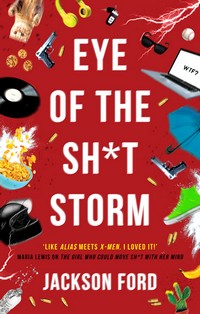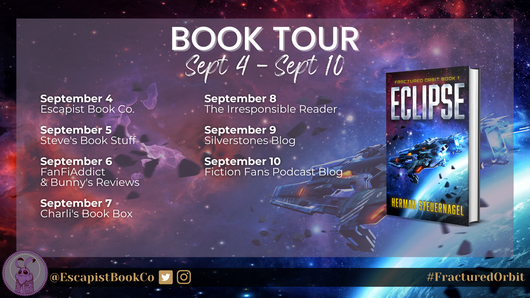
Chapter 4
Mikka Jenax
The Redemption
“This is taking too long. Why is this waystation so backed up?”
Mikka Jenax paced the bridge of the Redemption, hands behind her back. She was brooding, but she didn’t care. They had been waiting for over an hour, stuck in the queue.
The waystation wasn’t typically a stopping point for regular traffic, which was what irked Mikka the most. If this was the way orbital traffic was going, rum-running through the sector was going to be a nightmare, but it wasn’t as though she had any other career paths laid out for her.
“A wave of leftover debris from the Infinity.” Kiara Ryson strode across the shuttle, assuming her seat in the cockpit. Mikka shook her head as the woman straightened her faux leather jacket and pulled her sunglasses down over her face.
“I know that, genius, but the Syndicate’s had seven years to clean this mess. I’m tired of it backing up the transport corridors.”
“Just sit back and wait it out. We get paid either way.” Kiara’s matching brown boots found their way onto the edge of the console, and she crossed her legs at the ankles and leaned back. With the woman’s short frame, her feet barely reached the panel from the navigation console’s seat.
Agitation coursed through Mikka’s veins, and she couldn’t calm herself enough to sit. Kiara’s laid-back attitude was usually a godsend, an anchor in her spaceport, but right now, with their next round of credits on the line, it was infuriating. Mikka adjusted her own gray jacket and ran a hand through her coarse black hair before reaching under the counter of the navigational console and pulling out a bottle of whiskey.
Might as well enjoy some decent alcohol while we’re waiting. Stars know, there won’t be any once we get to Lunar.
“We’ll get paid for this load,” she said as she poured, “but we’ll be late for the next one. Every hour of delay means credits off our paycheck.”
“And what do you propose we do? There’s a river of debris between the stations we have to navigate around. I’m not about to blow a hole through our engines for a couple chips.”
“I’m not proposing we do anything.” Mikka swilled the drink in her glass, watching as the artificial gravity pulled the droplets against its side, before draining its contents in a single shot. “I just hate sitting around. I’ve got bills to pay.”
“I do too, but you don’t hear me whining.”
“Times are tight. My mother’s not getting any better.”
“Pfft.” Kiara waved a hand dismissively. “Times are always tight. You worry too much.”
Mikka bit her tongue as she poured another drink. She sipped this one slowly, allowing the woody taste of the alcohol to coat her tongue and throat as it slipped down. The amber liquid still bore the grit and metallic tint that Lunar whiskey always held, but it was a hell of a lot better than anything she’d find on the moon’s surface. The whiskey’s sharp fire was enough to distract her for a moment, but only barely. They had just picked up a shipment of computer parts and cabbage from Space Dock Eleven—one of their better-paying hauls. But their delivery window was narrow, and the clock was ticking.
If only we could get through this damn debris field.
The space station Infinity had been decommissioned seven years ago. A year later, some Syndicate fat cat decided it was time to put an end to the ghost station’s misery and pushed it into the Earth’s atmosphere, resulting in a series of explosions. Whoever that genius was, they hadn’t accounted for the chunks of metal, plastic, and the stars knew what else had been left behind from the explosion that ripped it apart. Instead of spreading, the fragments that were not drawn into the atmosphere clumped together in a hazardous blob. It usually occupied less frequently traveled paths, but over the past month, it had become lodged in the main transport corridor.
“It’s crazy we still can’t go around. These new space routes are getting on my nerves.”
“Easy, Mikka.” Kiara lifted both hands in a conciliatory motion. “We’ll deliver this shipment, pick up a round of Helium or whatever our next load is, and be on our way again before you know it. You might lose an hour or so of sleep, but no harm done. Chill out now and it won’t matter.”
“Looks like I don’t have a choice, do I?” Mikka slammed her glass down harder than she intended, sending a crack through its side. She grasped her temple between her thumb and forefinger, willing the knots above her brow to melt away. She didn’t have time for setbacks, and she was running out of patience. At some point, life had to throw her a bone.
“Is there any chance we can make up for it by taking a double load back?” she asked, hoping the suggestion didn’t come across as desperate.
“You’re really getting worked up, aren’t you?” Kiara commenced picking at the gunk beneath her fingernails with a nail file. “You know the drill—we can only take back what they’ve loaded up for us.”
The Redemption’s systems beeped and hummed around them, almost as if the ship was eagerly anticipating being allowed to continue on its way.
From where she was standing, Mikka could see a panel light blinking on the communications terminal, beeping in an irregular pattern.
“You expecting a call?” Kiara asked.
“Are you kidding? Who do I know? It’s probably just a patrol announcement.”
Kiara grunted, pulling up the details on her own console. “It’s no patrol. I don’t recognize this frequency.”
“Let’s see.” Mikka pulled up the holo-screen on her own console. The semiopaque projection came to life, hovering above her control pad.
A blinking bar of red lit up, displaying an incoming transmission on a frequency Mikka hadn’t seen used in a long time.
“Whoever it is, they’re using an old pirate channel,” she said. “But it’s one that’s been abandoned for years. The Orbital Guard cracked its encryption, and it’s been useless ever since.”
“Pirates?” Kiara’s tone grew serious for the first time all morning. “One of your old friends?” She stared at the panel, her eyes furiously darting between the readings as if considering whether there was danger in merely answering the hail. She ran her palms through her cropped purple hair. “What are we going to do?”
“Hang on!” Mikka lifted a hand toward her. “It could just be someone else found the frequency. Maybe it’s a wrong number.”
“Hilarious,” Kiara said, her arms crossed.
“A pirate wouldn’t use this channel; the encryption has been compromised. If they were after our ship, they’d use a different means of communication.” Just the same, only a pirate or the Orbital Guard would have access to the encryption.
The console continued to chirp.
Mikka sighed and leaned over the nearest terminal, tapping the screen. The face of a young woman was projected above her datapad. Her hair was white and cut short, except for a single silver braid that hung down the side of her face. Blue and green beads were tied within it, along with a smaller pull decorated with a few grubby ship parts, metallic shards, and white stones.
Not stones. Bones.
Through the static-filled feed, it was impossible to tell if the bones were human or animal, though Mikka had a pretty good idea.
The woman’s eyes— a smoky gray—were as mysterious as the rest of her, as was the scar that curved down through the top and bottom of her left eye socket, as though someone had tried to blind her.
The woman stood, strapped in to hold her from floating around a craft with no gravity. It was hard to tell through the haze of smoke that filled the cabin, but Mikka recognized the markings of the woman’s vessel.
An escape pod.
The woman didn’t even flinch as sparks and bursts of flame surrounded her. The image flashed in and out, and it was obvious the feed might not last long.
“Thanks for picking up, love. I presume you’re Jax Luana?”
Mikka caught her breath.
She scanned the woman’s features for a hint of recognition, something that would tie this woman to her old life. Even if the woman’s hair or eyes were another color, even if her scar was gone, there wasn’t anything about her that struck Mikka as being familiar.
Besides, she was too young to be someone from Mikka’s past. She was twenty at most, and no one had dared to call Mikka by the name of Jax Luana in seven years. That would have made the person projected before her thirteen when Mikka had left her old life behind. Even aboard a pirate vessel, thirteen would have been far too young. It was possible she could have come across a youth at a bar or port city, but if that were the case, clearly the encounter wasn’t memorable.
Yet somehow this woman recognized her.
“I haven’t used that name in a long time.” Mikka gritted her teeth, attempting to hide her disdain. She absently pulled a knife from her belt, fidgeting with it to both calm her mind and send a message that she was still someone who wasn’t to be messed with. “My name is Mikka Jenax. Who are you? How did you gain access to this channel, and why are you calling me?”
The woman glanced over her shoulder as a sharp pop sounded from somewhere behind her. Her eyes bulged as, presumably, she located whatever the source of the noise had been. She raised a finger, unclipped her safety restraints, and floated off-camera momentarily.
No gravity plating in those old escape pods. Her ship must have been a relic.
Mikka rolled her eyes at Kiara, but her co-navigator didn’t meet her gaze.
“Ah, yes.” The woman reappeared, the cape she had been wearing now gone, revealing sweaty but well-toned shoulders. “The name’s Abigail. And, well, as much as I’d love to get into specifics—this deathtrap is about to break apart. I’d love it if you could give me a lift.”
Mikka groaned. Bringing an unknown woman aboard would be a risk. The woman clearly had a connection to Mikka’s past—a past she wanted to avoid. And something didn’t smell quite right.
“Not without knowing anything about you. You’re calling me on an old, encrypted frequency, referring to me by a name that has been dead for seven years. Can’t blame me for being skeptical.”
“Let’s just say, I’m both a ghost from your past and a damsel in distress. I didn’t come looking for you, love, but my circumstances have become quite . . . dire.” Another burst of flame erupted behind Abigail’s head. “I think we could come to a mutual understanding.”
Great. This is just what I need.
“I gave that life up a long time ago,” Mikka insisted.
“Well, even if that is the case . . . could you at least save mine? I’m quite happy with the one I’ve got.”
Mikka cursed. “How much time do you have?”
She knew this was a bad idea, but there’d be no more lives lost because of her. Not if she could help it.
“Um . . .” Abigail’s eyes darted wildly to the surrounding capsule as she punched a few keystrokes on the pod’s display screens. “I’m actually kinda surprised I’m still here. I’m sending you my coordinates. You’re not far.”
Mikka nodded. “We’re on our way. Ping us again if the situation gets worse—but I can’t promise there’ll be anything we’ll be able to do if it does.”
“Aye, aye, captain.” Abigail gave a two-fingered salute accompanied by an impish grin as the screen faded to black.
Chapter 5
Mikka
The Redemption
“Are you insane?”
Kiara was on her feet, hands on her hips, marching toward Mikka.
Mikka raised an eyebrow. “Oh? Look who’s suddenly interested. You could have spoken up before. You kind of left me hanging there.”
“I didn’t expect you to be such an idiot! You can’t bring a pirate on board! We know nothing about her!”
Kiara turned to the console beside her and pulled up a holographic display. Kiara was a master at navigating the Syndicate network, but she still impressed Mikka with how quickly she had pulled up the profile of the woman on the escape pod.
Mikka’s eyes flashed. “Remember whose ship this is. I make the calls here.”
Kiara ignored her as she scrolled through the entry. “Smuggling. Theft. Conspiracy. Murder! Shit, I’m not ready to die today.”
Whatever sense of indifference Kiara had presented a few minutes ago had now disappeared. Being delayed on a job wasn’t something to get worked up about but letting a fugitive on board was another matter.
Understandably so, maybe, but . . .
“I don’t care who she is,” Mikka said. “I’m not leaving her out there to die. Not when she’s asked for our help.”
Kiara wasn’t ready to back down. “How do you know this isn’t a setup to lure us in? A trap to commandeer our ship?”
“She launched herself into a failing escape pod with the sole intent of hijacking a decades-old refurbished orbital trader? Is that what you think? There are easier, more lucrative targets out there.”
“Stranger things have happened.”
A fair point, but . . . No, Mikka couldn’t think of any legitimate reason why anyone would want the Redemption.
“I know how her type operate,” Mikka continued. “Our current payload isn’t worth the effort or the risk.”
“She knew you were here,” Kiara persisted. “That doesn’t raise red flags for you? She’s obviously learned enough to make you a target.”
And there it was. Kiara wasn’t implying the ship was the target.
I am.
The woman’s words hung over Mikka like a solar storm. “I presume you’re Jax Luana?”
Kiara was right: it did raise red flags. Huge, monumental red flags.
The only two people in the entire system who knew Mikka used to go by that name were her own mother and Kiara. Not only that, but Mikka had also undergone dozens of surgical procedures to alter her appearance, until she no longer resembled the woman Abigail had named.
Be that as it may, though, her mind was made up.
“I’m not leaving her out there to die,” Mikka reaffirmed, punching in the coordinates into the ship’s navigation system. “You can cuff her in the cargo hold until we get to Shackleton City if it makes you feel better, but let’s get her ass out of that pod before we decide what to do with her.”
“Toss her out the airlock—that’s what we should do with her,” Kiara muttered under her breath.
“We’re about ten minutes out,” Mikka said, ignoring the remark. “Hopefully, her pod can hold together until then.”
“It wouldn’t be the worst thing if we didn’t make it.”
Mikka grabbed the cracked whiskey glass beside her and hurled it across the shuttle. It landed squarely against an empty wall panel, shattering under the force of the impact. A million pieces of broken glass spread out along the hard paneled floor.
Kiara’s eyes grew wide with horror.
“What the hell is your problem?” Mikka shouted. “That could have been me in that pod! Do you think I didn’t deserve a second chance? Do you think I should have died with my companions? With my friends? Because if you do, you can find another ship.”
Kiara didn’t respond, instead looking bashfully toward her own console.
“Damn it, Kiara! A life’s a life,” Mikka said, composing herself. “Everyone deserves a shot. If someone hadn’t taken a chance on me, I wouldn’t be here now. Enough of the bullshit.”
“Fine.” Kiara held her hands up in mock surrender. “But don’t say I didn’t warn you.”
She picked up an energy weapon—her trusty SC11 pistol—from beside her station and attached it to her belt. “And don’t think I’m letting her out of my sight. I might help save her life, but I’m not above locking her in the holding cell or calling in a patrol.”
“You call in a patrol and you risk exposing me as well,” Mikka reminded her. “I’m taking a monumental risk here. Don’t forget I have sins I need to atone for, and that pirate’s just admitted she knows more than she should. This is still my ship, Kiara; I may have agreed to split our profit for your expertise, but I’m still the one who calls the shots.”
Mikka tapped the projection before her with a few keystrokes. “I’m sending you the coordinates of the pod. The only thing I’m concerned about is making it back in time to hit our window through the debris field. We’ve got thirty minutes.”
“As long as I’m not the one who ends up out the airlock,” Kiara groused, pulling up her own holographic display. “Just promise me you won’t let her talk you into anything stupid.”
“I’ve got a sick mother to worry about. That’s enough excitement for me.”
The Redemption groaned as it propelled into a lower orbit. The crest of the Earth filled the viewport as the ship flew toward Abigail’s position.
Abigail wouldn’t have to worry about the void of space for long: she would soon enter the Earth’s atmosphere, and those pods weren’t made to withstand entry. She’d burn up long before she ran out of air.
“We’ve got to get off the main route,” Mikka said. “We’re not going to make it in time otherwise.”
“Might catch the attention of the OG if we do that,” Kiara warned. “If we get pulled over by a patrol, we won’t make it, either.”
Mikka cursed under her breath. Kiara was right, but she didn’t see they had any other choice. Plus, the woman was slowly becoming a thorn in her side, so she didn’t want to give her the satisfaction of being right.
“We’ll deal with that if it happens.”
Kiara shook her head but didn’t argue.
It didn’t take long before the Redemption’s scanners picked up the solitary pod adrift in the lower orbit, just off the main transport corridor. The gray escape vessel floated among a sea of debris, much of it several times larger than the pod itself. If it hadn’t been for Abigail’s distress call, Mikka would likely have never seen it among the rest of the floating remains, never mind known that there was a person inside.
Her ship didn’t just run into trouble, Mikka realized. It bloody exploded!
Whatever trouble this pirate had gotten herself into was possibly a bigger deal than Mikka had first realized. Orbital attacks weren’t common, especially this close to the planet. If her ship’s destruction was simply a matter of Abigail’s criminal record, there would have been other ways to handle things.
Mikka tapped her communications terminal. “Abigail, we’re descending to your position. Are you still there?”
“I’m here,” the pirate’s voice chirped. “But I’ve lost my video feed.”
“Is your docking equipment functional?” Mikka asked. “Are you able to connect to our clamps?”
“I don’t have any fuel, love. I’m dead in the water. All I’ve got is enough air to see the end of my days as I incinerate in orbit, and enough power to keep this channel open for a few more minutes.”
“All right.” Mikka nodded to herself. “Kiara, how close can you get us to the pod without being ripped apart by the surrounding debris?”
Kiara met her gaze. “Are you doubting me?”
“I’m just asking!” Mikka shot back.
“We can kiss her on the nose if you want.”
“Perfect, but she’ll be coming in the other end. Back her up so we can pull that pod into the cargo bay. I’ll seal it off manually.”
“It’s a good thing we loaded our shipment below deck this round.”
Mikka hit another few commands on her console. “Abigail, we’re going to pull you into our cargo hold. You shouldn’t get banged around too much, but you should probably strap yourself in.”
“Already buckled—and I’ve got nowhere else to go, love. Do what you need to do.”
The Redemption shook again as Kiara decelerated, weaving around some of the larger pieces of debris.
“Hang on,” Kiara said. “I’ll get us in, but there’s a lot of garbage here. It could get bumpy.”
As promised, the shuttle rattled and bounced as it slowed. Mikka did her best to hang on as she pulled each of the four toggles that would seal off the ship’s bridge from the cargo bay and braced herself for the inevitable turbulence. The pressurized seal allowed them to release objects into the void of space, but they didn’t typically try to bring objects in. It was an unusual maneuver, but if anyone could pull it off, it was Kiara.
“I’m opening the cargo door now,” Mikka said.
“Reversing engines to overtake the pod,” Kiara replied.
There was a faint whoosh and a crack formed in the wall behind them. The Redemption groaned as she strained beneath the atmospheric pressure. A thud and a couple of shudders told Mikka their task had been successful, even before Kiara reported the outcome.
“And she’s in. Re-pressurizing the cargo bay.”
Mikka let out a sigh of relief. “All right. We’ve got twelve minutes until the waypoint sends us to the back of the line. I’d rather not miss our window through the debris field. Let’s get back and take this shipment home.”
“And hope the Guard doesn’t want to inspect our ship on the way through.”
“They won’t. The gates are backed up enough already.”
As if in response to her promise, the holo-screens and monitors in the shuttlecraft all shifted. Big, bold text in orange and red lit their screens, and a rendering of Abigail’s bust hovered above the panels.
Emergency Bulletin.
Fugitive Wanted. Charges: Theft. Conspiracy. Piracy. Murder.
Abigail Monroe. 10,000 Credit reward.
Mikka caught her breath.
“Spoke too soon. Looks like we won’t need to kill her,” Kiara remarked. “We can just turn her in.”
My thanks to Escapist Book Tours for the invitation to participate in this tour and the materials (including the novel) they provided. The opinions expressed by me are honest and my own.

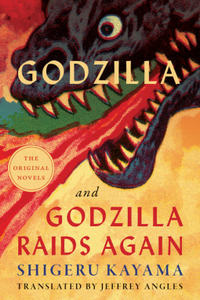 Godzilla and Godzilla Raids Again
Godzilla and Godzilla Raids Again

![]()







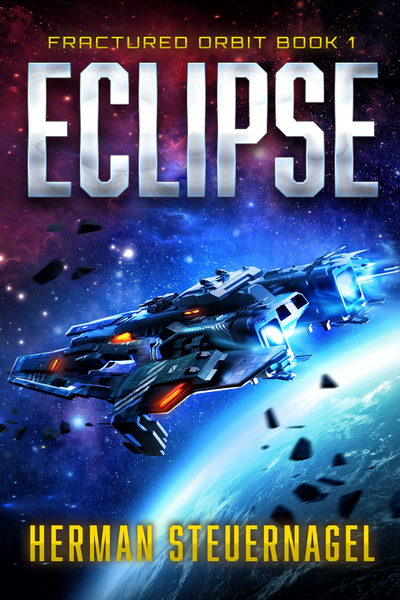

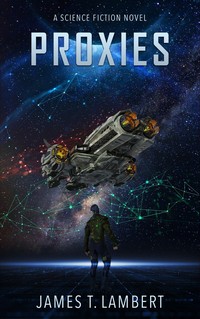


 Grab a book, any book.
Grab a book, any book.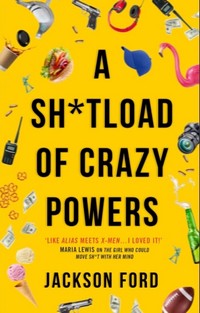
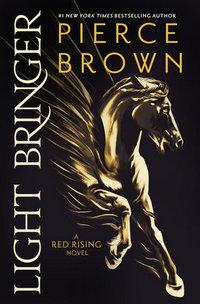
 I need to start with the fact that I went into this with a wrong assumption—I misunderstood something I saw Brown say on Twitter some months ago and thought that this was the finale of the series. I started wondering pretty soon how that was going to be the case, but it took me far too long to admit that I misunderstood him and shouldn’t expect any kind of bow to be put on things by the end of Light Bringer. Once I gave that up, most of my lingering questions about pacing and character went away.
I need to start with the fact that I went into this with a wrong assumption—I misunderstood something I saw Brown say on Twitter some months ago and thought that this was the finale of the series. I started wondering pretty soon how that was going to be the case, but it took me far too long to admit that I misunderstood him and shouldn’t expect any kind of bow to be put on things by the end of Light Bringer. Once I gave that up, most of my lingering questions about pacing and character went away.
